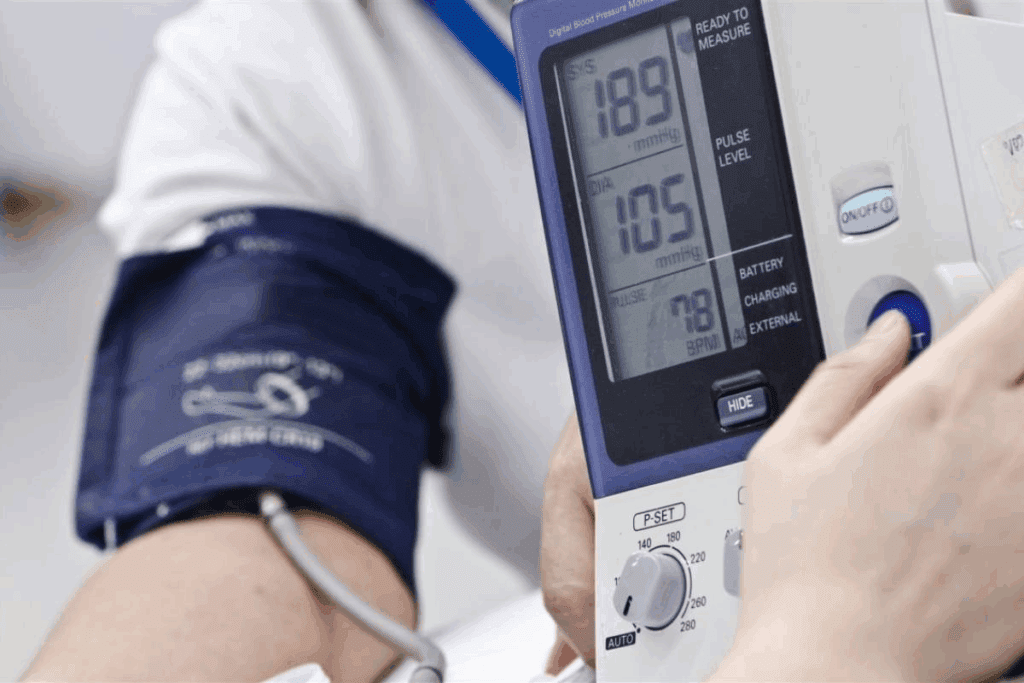
Ever wondered why your blood pressure might spike without reason? At Liv Hospital, we focus on your health with expert care. We help manage sudden blood pressure increases.
Learn causes of sudden increase in blood pressure and prevention methods.
It’s important to know what causes a temporary elevated blood pressure. We’ll look at stress, some medicines, and health issues that can lead to sudden spikes.

It’s important to know why blood pressure can suddenly rise. This can be scary and is often caused by everyday things. We’ll look at what makes blood pressure jump, the difference between normal and high blood pressure, and how the body controls it.
A sudden jump in blood pressure means a big rise above what’s usual for you. Blood pressure has two numbers: systolic (top number) and diastolic (bottom number). A spike can happen in either or both of these.
Temporary elevated blood pressure can be caused by stress, certain foods, or exercise. Knowing what triggers it helps manage blood pressure.
Normal blood pressure is usually under 120/80 mmHg. Temporary hypertension is when blood pressure goes up but doesn’t last. It can be due to stress, anxiety, or some medicines.
Keeping blood pressure in check involves the heart, blood vessels, and nerves. The body has ways to control it, like the baroreflex mechanism. This system senses blood pressure changes and tells the brain to adjust heart rate and blood vessel size. Knowing how this works helps understand sudden spikes in blood pressure.

Knowing why blood pressure spikes suddenly is key to managing high blood pressure. Many things can cause sudden blood pressure increases. These include short-term conditions, lifestyle choices, and health issues.
Hypertension can be either temporary or chronic. Temporary hypertension might be due to stress, certain meds, or short-term lifestyle changes. Chronic hypertension, though, is a long-term issue that needs constant care.
The American Heart Association says some risk factors raise the chance of sudden high blood pressure. Being African American, obese, or stressed can increase risk. Drinking too much alcohol, eating lots of salt, having a family history of high blood pressure, diabetes, or smoking also play a part.
| Risk Factor | Description | Impact on Blood Pressure |
| Obesity | Being significantly overweight | Increases strain on the heart, leading to higher blood pressure |
| Stress and Anxiety | Frequent or intense stress | Causes temporary spikes in blood pressure |
| High Sodium Intake | Consuming excessive salt | Can lead to fluid retention, increasing blood pressure |
To spot random blood pressure spikes, you need to check your blood pressure often. Knowing what can cause sudden increases helps. Keeping a blood pressure log can also track changes and patterns.
“Regular monitoring of blood pressure is essential for detecting and managing hypertension. By understanding the causes of blood pressure fluctuations, individuals can take proactive steps to control their condition.”
— American Heart Association
Many factors can lead to blood pressure changes. These include health conditions, lifestyle choices, and genetics. Knowing these risk factors helps prevent blood pressure issues.
Key Risk Factors:
Understanding sudden blood pressure increases and personal risk factors is key. Working with healthcare providers helps create effective management plans.
Stress, anxiety, and emotional responses can suddenly raise blood pressure. Knowing these triggers is key to keeping our heart health in check.
Stress is a big contributor to high blood pressure. When stressed, our body releases hormones like adrenaline and cortisol. These hormones make our heart rate and blood pressure go up. Regular exercise and stress management can help lower blood pressure.
Studies show that regular exercise and stress-reducing activities, like meditation, can lower blood pressure. This can also reduce the risk of high blood pressure.
Anxiety and panic attacks can also raise blood pressure. During these episodes, our body’s stress response is triggered, leading to a faster heart rate and higher blood pressure. Managing anxiety through therapy and lifestyle changes can help lessen these episodes.
Feeling angry or frustrated can also affect blood pressure. Long-term emotional stress can cause high blood pressure, raising the risk of heart disease. It’s important to find healthy ways to deal with emotions, like mindfulness or talking to friends.
| Psychological Trigger | Effect on Blood Pressure | Management Strategy |
| Stress | Increases blood pressure through stress hormones | Regular exercise, stress management techniques |
| Anxiety/Panic Attacks | Causes sudden spikes in blood pressure | Therapy, relaxation techniques, lifestyle changes |
| Emotional Responses | Can lead to chronic high blood pressure | Mindfulness, social support, healthy coping mechanisms |
Knowing what foods can raise blood pressure is key to heart health. What we eat greatly affects our health. Some foods can cause blood pressure to go up temporarily.
Caffeine is in coffee, tea, and energy drinks. Too much caffeine can raise blood pressure. Moderation is key to avoid this.
Tyramine helps control blood pressure. Foods like aged cheeses and fermented meats have a lot of it. Eating too much can raise blood pressure. Knowing what foods have tyramine is important.
Too much sodium can lead to high blood pressure. We should eat less than 2,300 milligrams of sodium daily. Reading food labels helps choose low-sodium foods.
| Food Category | High Sodium Foods | Low Sodium Alternatives |
| Processed Meats | Bacon, sausages, canned meats | Fresh poultry, fish, lean meats |
| Condiments | Soy sauce, teriyaki sauce, fish sauce | Herbs, spices, homemade sauces |
| Snacks | Chips, pretzels, salted nuts | Unsalted nuts, fruits, vegetables |
Drinking alcohol can affect blood pressure. While some can handle a little, too much can raise blood pressure. Limiting alcohol intake helps manage blood pressure.
By watching what we eat and drink, we can keep our blood pressure in check. This reduces the risk of heart problems.
Some medications can make blood pressure go up. This includes over-the-counter drugs, prescription meds, and herbal supplements. Knowing how these can affect blood pressure is key to controlling high blood pressure.
OTC drugs help with many health issues. But, some can raise blood pressure. For example, NSAIDs like ibuprofen and naproxen can do this. It’s important to use these drugs carefully and with a doctor’s advice.
Prescription meds can also impact blood pressure. Drugs like corticosteroids and some antidepressants can raise it. Patients should tell their doctors about any changes in their meds.
Examples of prescription drugs that can affect blood pressure include:
Herbal supplements are thought to be safe but can raise blood pressure. Ephedra (ma huang) and licorice root are examples. It’s important to talk to a doctor before taking herbal supplements, if you have high blood pressure or are on blood pressure meds.
Not taking blood pressure meds as directed can also cause spikes. Sticking to your medication plan is key to keeping blood pressure stable.
Knowing how different medications can affect blood pressure helps manage hypertension. Always talk to a healthcare professional before starting or stopping any medication.
Our bodies react to stress like pain and dehydration by raising blood pressure. This is a natural defense, but it can be a worry if it happens often. It’s something to watch if you’re keeping an eye on your blood pressure.
Acute pain can quickly raise your blood pressure. When we feel pain, our body goes into “fight or flight” mode. This releases stress hormones like adrenaline, making our heart rate and blood pressure go up. This effect is usually short-lived, but for people with high blood pressure, it can be more serious.
Intense exercise can also raise your blood pressure for a while. When we exercise, our heart pumps more to supply our muscles with oxygen. This leads to higher blood pressure readings. Regular exercise can lower your blood pressure over time, but it’s key to check your blood pressure during and after working out, if you have heart issues.
Dehydration can make your blood pressure go up. When we’re dehydrated, our blood volume drops, and our body tries to keep vital organs supplied. This makes our blood vessels narrow and our heart work harder, raising blood pressure. It’s important to stay hydrated, more so in hot weather or during hard exercise, to avoid blood pressure spikes.
In summary, physical stressors like pain, exercise, and dehydration can affect your blood pressure. Knowing about these factors and managing them can help keep your blood pressure in a healthier range.
Everyday habits can greatly affect our blood pressure, making it go up and down unexpectedly. Our lifestyle choices are key to our heart health. Knowing how these habits impact us is vital for controlling blood pressure.
Smoking is a big risk for heart disease, and nicotine is a major reason for blood pressure spikes. Nicotine makes the heart beat faster and blood pressure go up. This is bad for people with high blood pressure or heart problems.
Nicotine’s immediate effects on the heart include making blood vessels narrow. This makes blood pressure even higher. Quitting smoking is a big step in managing blood pressure and heart disease risk.
Poor sleep and sleep disorders like sleep apnea are linked to high blood pressure. Sleep apnea causes breathing stops during sleep, leading to blood pressure changes. Bad sleep also raises stress, making blood pressure worse.
Sleep apnea causes sudden blood pressure spikes at night. These changes are hard to control with usual blood pressure treatments. Treating sleep apnea and improving sleep quality are key to managing blood pressure.
A sedentary lifestyle, with little exercise, increases the risk of high blood pressure. Exercise keeps blood vessels healthy and improves heart function, lowering hypertension risk.
Regular exercise helps counteract a sedentary lifestyle. Adding physical activity, like walking or cycling, to daily life improves blood pressure and overall health.
For some, going to a doctor’s office can make their blood pressure go up. This is called white coat hypertension or white coat syndrome.
White coat hypertension means your blood pressure is higher at the doctor’s office than at home. It happens because of stress or anxiety from medical visits.
It’s important to know if you have white coat hypertension. It shows up as high blood pressure at the doctor’s office but normal or lower at home.
Some signs you might have white coat hypertension include:
Studies show that 15-30 percent of people see their blood pressure go up at the doctor’s office. This shows how common white coat hypertension is and why doctors need to know about it.
| Condition | Percentage |
| White Coat Hypertension | 15-30% |
| Masked Hypertension | 10-20% |
It’s important to manage your anxiety when you visit the doctor. Here are some ways to do it:
By understanding and dealing with white coat syndrome, you can get more accurate blood pressure readings. This helps in managing your hypertension better.
Several health issues can lead to sudden blood pressure increases. These include kidney disease, thyroid disorders, adrenal gland problems, and heart issues. Knowing about these conditions helps in managing and preventing high blood pressure.
Kidney disease is a major cause of high blood pressure. The kidneys help control blood pressure by managing fluid and electrolyte levels. When kidneys are diseased, they can’t do this well, causing blood pressure to rise.
Kidney disease and blood pressure are closely related. Conditions like chronic kidney disease (CKD) can make blood pressure go up. This is because the kidneys can’t filter waste and excess fluids as well.
| Kidney Disease Stage | Impact on Blood Pressure |
| Early Stage CKD | Mild increase in blood pressure |
| Advanced Stage CKD | Significant hypertension |
| End-Stage Renal Disease | Severe hypertension, often requiring dialysis |
Thyroid problems, like hyperthyroidism and hypothyroidism, can also affect blood pressure. The thyroid gland controls metabolism, which affects heart rate and blood pressure.
“Thyroid hormones have a direct effect on the cardiovascular system, and abnormalities in thyroid function can lead to changes in blood pressure.”
Hyperthyroidism can make the heart rate and output go up, raising blood pressure. Hypothyroidism can lower cardiac output and blood pressure.
The adrenal glands make hormones that help control blood pressure. Problems like Cushing’s syndrome and pheochromocytoma can cause blood pressure to swing.
Cushing’s syndrome, with too much cortisol, can raise blood pressure. This is because cortisol affects the heart and fluid balance.
Pheochromocytoma, a rare tumor, can cause sudden high blood pressure. This is due to the release of too much adrenaline.
Heart diseases, like heart failure and coronary artery disease, can also affect blood pressure. Heart failure, for example, can make blood pressure go up as the heart works harder.
Managing these health conditions is key to controlling blood pressure. By understanding the link between these conditions and hypertension, people can take steps to reduce its impact.
Knowing when to get medical help for high blood pressure is key. At Liv Hospital, we focus on finding and fixing the root causes. This helps avoid serious problems later on.
Changing your lifestyle can help control blood pressure. Stress management, deep breathing, and drinking plenty of water can lower it. These habits can make a big difference in managing high blood pressure.
To prevent blood pressure spikes, eat well, watch your salt intake, and exercise often. Our team at Liv Hospital is dedicated to top-notch care for high blood pressure. We offer full support to international patients looking for advanced treatments.
Being proactive about managing blood pressure can greatly improve your health. For tailored advice on handling high blood pressure, talk to our skilled doctors at Liv Hospital.
Many things can cause blood pressure to suddenly rise. Stress and anxiety are big factors. Certain medicines and health issues like kidney disease also play a role.
Knowing what normal blood pressure is is key. Watch for any changes. Regular checks can spot spikes. Knowing what can cause these changes helps manage blood pressure.
Yes, what you eat can affect your blood pressure. Too much caffeine, tyramine, sodium, or alcohol can raise it. Knowing this can help prevent sudden spikes.
Some medicines can make blood pressure go up. This includes over-the-counter and prescription drugs, and even herbal supplements. Knowing how these can affect you is important for managing blood pressure.
Yes, lifestyle choices can impact your blood pressure. Smoking, poor sleep, and being inactive can all cause spikes. Changing these habits can help keep your blood pressure stable.
White coat syndrome is when blood pressure goes up in a doctor’s office. It’s due to stress or anxiety. Understanding this can help manage your blood pressure during visits.
Stress and anxiety can raise blood pressure. Techniques like deep breathing, meditation, or yoga can help. Knowing how stress affects your blood pressure is key to managing it.
If your blood pressure spikes often or severely, see a doctor. Knowing when to get help and how to prevent spikes is important for managing blood pressure.
Yes, certain health issues can cause blood pressure to spike. Kidney disease, thyroid problems, and heart issues are examples. Understanding these can help manage and prevent spikes.
To prevent spikes, live a healthy lifestyle. Eat well, exercise, manage stress, and check your blood pressure regularly. Knowing what causes spikes is key to preventing them.
Government Health Resource. (2025). 12 Causes of Sudden Increase in Blood Pressure. Retrieved from https://www.heart.org/en/health-topics/high-blood-pressure/understanding-blood-pressure-readings
Subscribe to our e-newsletter to stay informed about the latest innovations in the world of health and exclusive offers!
WhatsApp us